Regulatory
Used oil has been banned from disposal in all Missouri landfills since Jan. 1, 1991. All used oil must be managed in a way that does not adversely affect human health or the environment or create a public nuisance. Disposal of used oil into wastewater systems, down storm drains or on the ground causes needless damage to water resources and wastes a valuable renewable resource. The use of used oil as a dust suppressant on a road, parking lot, driveway or similar surface is also prohibited.
A responsible way to manage used oil is through a community "do-it-yourselfer" (DIY) used oil collection program. It is important to keep up to date on local, state and federal regulations and how they may affect the operation of your collection program. Used oil that is recycled will not be classified as a hazardous waste in Missouri. Federal recycled used oil management standards have been adapted by the Missouri Department of Natural Resources (MDNR). Recycling includes re-processing, re-refining or burning used oil for energy recovery. Used oil that cannot be or is not intended to be recycled in accordance with the recycled used oil management standards must be managed as a hazardous waste.
Community DIY used oil collection centers must comply with standards set by the MDNR. They are required to:
- Notify MDNR Hazardous Waste Program by letter of used oil collection activities.
- Provide adequate storage for the used oil, such as drums or tanks that are in good condition and have no leaks.
- Label or clearly mark the drums or tanks with the words "used oil."
- Keep all drums or tanks that are exposed to rainfall closed at all times except when adding or removing used oil.
- Control public access to the used oil storage area.
- Have an attendant present when the public has access to the used oil collection center.
- Upon detection of a release of used oil to the environment, stop the release, contain the released used oil, clean up and properly manage the released used oil, and repair any leaking used oil storage containers. Report spills of 50 gallons or more to the MDNR.
- Use a licensed used oil transporter for used oil shipments in excess of 55 gallons leaving the collection center.
- Ship used oil only to a facility which is approved to accept used oil.
- Regardless of the quantity, limit storage of collected oil to 12 months or less before it is shipped off site for recycling.
Technical
Site
The site for a DIY used oil collection center can be a city- or county-owned facility, fire station, landfill or transfer station, recycling center, or even a privately owned business.
Equipment
Licensed used oil disposal companies that serve Missouri will retrieve oil from 55-gallon drums or larger collection tanks. The ideal design for a community DIY used oil collection program is a large, double-walled tank (150 to 275 gallon), with a screened and covered drainage area, surrounded by an impervious containment area in case of spillage. Some companies provide large tanks for a one-time or yearly rental fee. (See Designs 1 and 2 of used oil collection tanks.)
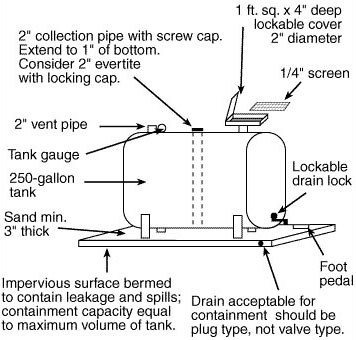 Design 1
Design 1
Sample oil collection tank design.
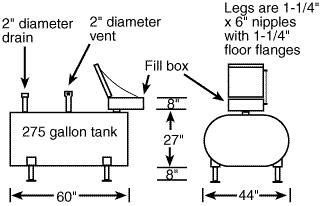 Design 2a
Design 2a
Typical used oil tank dimensions.
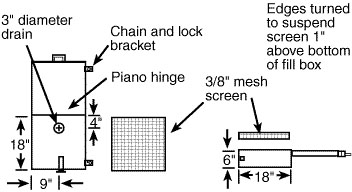 Design 2b
Design 2b
Concrete containment area.
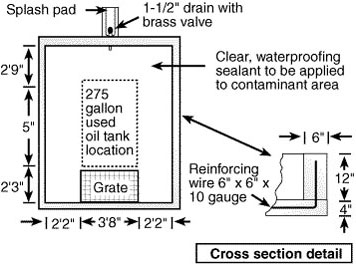 Design 2c
Design 2c
Fill box detail.
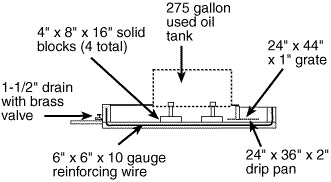 Design 2d
Design 2d
Side view.
Scanning incoming used oil with a halogen detector can prevent unwanted contamination of the used oil collection tank. Halogen detectors are hand-held devices that detect the presence of added hazardous substances which contain halogens, such as pesticides and solvents. Halogen detectors can be purchased through safety equipment suppliers, starting at about $100. MDNR requires used oil transporters to determine the total halogen content of the used oil. If the total halogen content is above 1,000 ppm, the used oil may be regulated as a hazardous waste.
Non-biodegradable absorbents, such as cat-box filler or a commercial product, should be kept on hand for cleaning up minor spills.
Personal protection equipment should be provided for staff, including protective clothing, nitrile gloves and chemical splash goggles.
Recommended procedures
- Used oil is brought to the collection facility. You may wish to limit the quantity accepted from each householder. Householders bringing in used oil are asked to sign in, recording the amount of used oil deposited, their name, address and signature in a log book.
- Householders are asked if the used oil has been mixed with any other substance. Visually inspecting and scanning the used oil with a halogen detector can minimize the potential for contamination.
- Staff drains used oil through a wire mesh into the collection tank. Each staff member handling used oil should take precautions against skin and eye contact by wearing nitrile gloves, chemical splash goggles and protective clothing.
- Staff locks or secures the tank to prevent dumping when the tank is not supervised.
- Clean up minor spills using a non-biodegradable absorbent.
- Check tanks periodically for leaks.
Management
Choosing a company
Because a DIY collection program could be liable for any collected used oil that is disposed of improperly, you must ensure that the used oil is picked up by a responsible, licensed transporter and sent to a reputable recycler or disposal facility. In choosing a used oil transporter or management company, make certain the company:
- Has valid licenses and operates in a safe and enviromentally sound fashion;
- Maintains regular records of the quantities of used oil that are collected, delivered and handled;
- Delivers used oil to reputable management facilities;
- Guarantees coverage of any accidents that may occur in transportation; and
- Signs a contract with the DIY collection program that describes how the transporter will meet the above terms.
Contact the MDNR for a list of transporters licensed to haul used oil in Missouri and for a list of approved facilities that re-process, re-refine or burn used oil for energy recovery. Also contact the MDNR to check a company's compliance history.
You may also want to check with the following sources:
- Nearby municipalities and local businesses that may have used a specific used oil disposal company in the past.
- Trade associations that may keep a file on companies which handle used oil.
- The Chamber of Commerce or Better Business Bureau to find out if any complaints have been registered against a company or facility.
Checking sources and choosing a used oil transporter and management company can be time-consuming. Begin your research long before you need to transport the used oil. Careful selection is essential to minimizing liability.
Fate of used oil
Used oil may either be re-refined for use as a lubricant or burned as a fuel. Only a small percentage of the total collected used oil is re-refined. The majority of used oil is burned in industrial furnaces, cement kilns or other burners. Oil used as fuel must be processed to remove insoluble contaminants and water. Your selection of a management company may determine how your used oil is managed.
Generators are allowed to burn used oil in used oil-fired space heaters, provided that the heaters burn only used oil that they generated or collected from householders. These used oil burners must be designed to have a maximum capacity of 0.5 million Btu per hour, and the combustion gases must be vented to the ambient air.
Oil-contaminated wastes
Materials contaminated with used oil from which the used oil has been removed to the extent that no visible signs of free-flowing oil remain are not regulated as used oil, provided that they are not burned for energy recovery. If the material exhibits the characteristics of a hazardous waste or is contaminated with a listed hazardous waste, it must be managed as hazardous waste. If the material is not hazardous and has no signs of free-flowing liquid, it may be accepted for disposal at a sanitary landfill in compliance with the Missouri Solid Waste Management Law and Regulations. The MDNR retains the authority to require special waste approval for this type of waste.
Typical examples of oil-contaminated materials include absorbents used to clean up minor spills, oil-contaminated soil, oily shop rags and dirt or grease from drain traps or other similar devices. The used oil drained or removed from these materials must be managed as a used oil.
Management of spent oil filters
Used oil filters can contain up to 1 quart of used oil and pose an environmental threat if improperly disposed. Some companies will accept used oil filters for disposal or recycling. These are collected, either crushed or uncrushed, in a small drum. Disposal fees are calculated by the drum. Crushing the oil filters allows more filters per drum, thereby reducing disposal costs. Crushing or shredding oil filters also allows more thorough removal of the used oil. Check with your used oil disposal company to determine if it accepts oil filters, how it will accept them and how the company disposes of or recycles them.
If oil filter collection is not an option in your area, householders should be instructed to properly drain oil filters. A well-drained filter is one that has been punctured and drained for a minimum of 12 hours near engine operating temperature and above room temperature. All oil collected from the filter should be managed with other used oil. Well-drained oil filters may be sent to a sanitary landfill for disposal.
Contacts and resources
State contact
Missouri Department of Natural Resources, P.O. Box 176, Jefferson City, Mo. 65102
Hazardous Waste Program: 573-751-3176
Technical Assistance Program: 573-526-6627
Publications
A Guidebook for Implementing Curbside and Drop-off Used Motor Oil Collection Programs, written by the Washington Citizens for Recycling Foundation, February 1992. Available from the American Petroleum Institute, 1220 L Street, N.W., Washington, D.C. 20005.
Environmental Protection Agency Publications
- How To Set Up A Local Program To Recycle Used Oil (EPA/530-SW-89-039A)
- Recycling Used Oil, What Can You Do? (EPA/530-SW-89-039B)
- Recycling Used Oil, For Service Stations and Other Vehicle-Service Facilities (EPA/530-SW-89-039D)
- Collecting Used Oil for Recycling/Reuse, Tips for Consumers Who Want to Change Their Own Motor Oil and Oil Filters (EPA/530-F-94-008)
- Used Oil Recycling (EPA/530/SW) Quarterly newsletter
To obtain free copies of the above EPA publications, call the RCRA Hotline at 800-424-9346 or write to: RCRA Information Center (OS-305), U.S. Environmental Protection Agency, 401 M Street, S.W., Washington, D.C. 20460.